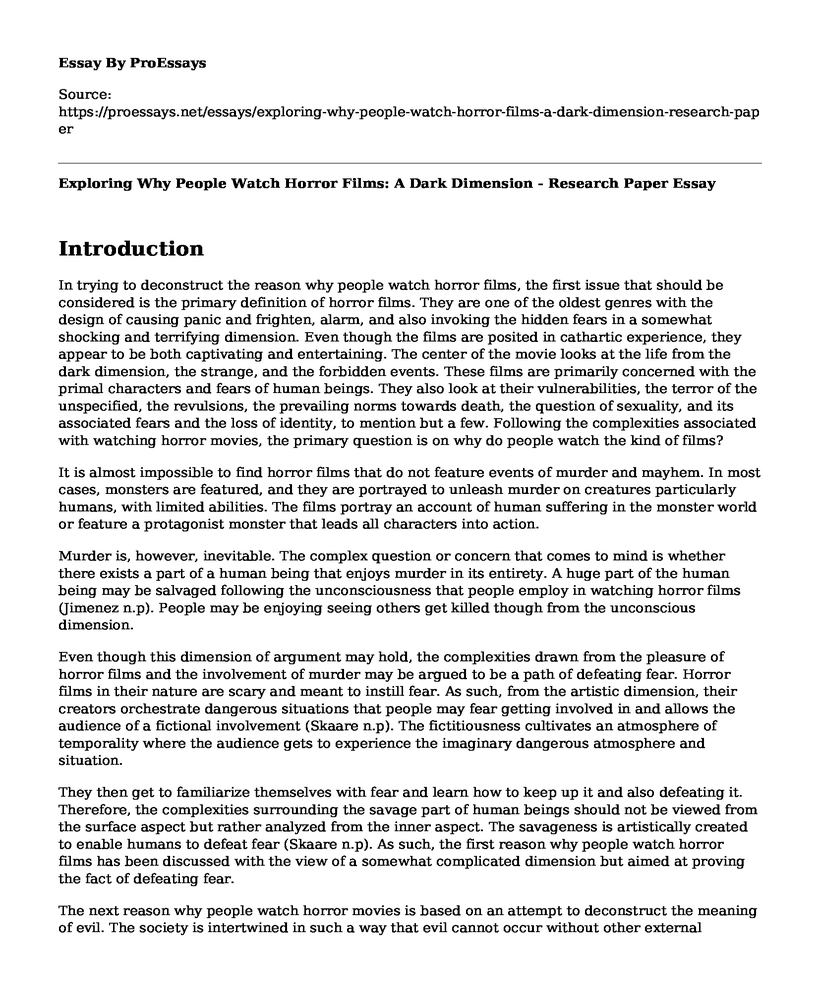Introduction
In trying to deconstruct the reason why people watch horror films, the first issue that should be considered is the primary definition of horror films. They are one of the oldest genres with the design of causing panic and frighten, alarm, and also invoking the hidden fears in a somewhat shocking and terrifying dimension. Even though the films are posited in cathartic experience, they appear to be both captivating and entertaining. The center of the movie looks at the life from the dark dimension, the strange, and the forbidden events. These films are primarily concerned with the primal characters and fears of human beings. They also look at their vulnerabilities, the terror of the unspecified, the revulsions, the prevailing norms towards death, the question of sexuality, and its associated fears and the loss of identity, to mention but a few. Following the complexities associated with watching horror movies, the primary question is on why do people watch the kind of films?
It is almost impossible to find horror films that do not feature events of murder and mayhem. In most cases, monsters are featured, and they are portrayed to unleash murder on creatures particularly humans, with limited abilities. The films portray an account of human suffering in the monster world or feature a protagonist monster that leads all characters into action.
Murder is, however, inevitable. The complex question or concern that comes to mind is whether there exists a part of a human being that enjoys murder in its entirety. A huge part of the human being may be salvaged following the unconsciousness that people employ in watching horror films (Jimenez n.p). People may be enjoying seeing others get killed though from the unconscious dimension.
Even though this dimension of argument may hold, the complexities drawn from the pleasure of horror films and the involvement of murder may be argued to be a path of defeating fear. Horror films in their nature are scary and meant to instill fear. As such, from the artistic dimension, their creators orchestrate dangerous situations that people may fear getting involved in and allows the audience of a fictional involvement (Skaare n.p). The fictitiousness cultivates an atmosphere of temporality where the audience gets to experience the imaginary dangerous atmosphere and situation.
They then get to familiarize themselves with fear and learn how to keep up it and also defeating it. Therefore, the complexities surrounding the savage part of human beings should not be viewed from the surface aspect but rather analyzed from the inner aspect. The savageness is artistically created to enable humans to defeat fear (Skaare n.p). As such, the first reason why people watch horror films has been discussed with the view of a somewhat complicated dimension but aimed at proving the fact of defeating fear.
The next reason why people watch horror movies is based on an attempt to deconstruct the meaning of evil. The society is intertwined in such a way that evil cannot occur without other external influences. Horror films try to restore independence in their genres (Terrill n.p). The films portray monster developments from different stages and do not associate them with any external force; they show the monsters as independent creatures in their world that later cultivates danger in the human world. In some cases, humans are posited to defeat monsters following the invention of technology and the high intellectuality of human beings.
The least complex reason why people watch horror movies is on the entertainment aspect. The artistic creation of the films is coupled with numerous features that reduce the impact of fear and focusing on the entertainment part to the audience. They are also coupled with musicality elements and, as such, creates an atmosphere of enjoyment to the audience. Horror films should, therefore, not only be viewed from their natural dimension of instilling fear amongst the audience and other negative effects that may define their nature but also from the positive dimensions (Terrill n.p).
Conclusion
In summary, the reasons why people watch horror movies has first been provided with the invocation of a rhetorical question and the associated concerns that engulfs the films within the introductory paragraph. The discussion has also been conducted in line with the ABC analysis, where the most complex reason to the least complex one has surfaced. From a complex perspective, the reason for defeating fear took dominance. The complexities came in with certain intriguing questions considering that the films also feature certain situations and experiences that human beings fear getting associated with. For example, murder to mention but a few. The next reason got based on the independent understanding of evil and deconstructing the norm of viewing evil from the dimension of being dependent on external forces. The least complex reason featured the entertainment aspect. Like any other genre, horror films also entertain the audience while playing other didactic functions. The audience draws pleasure from watching them based on the aspect of musicality and other artistic styles that enhance their aesthetic value.
Works Cited
Jimenez, Monica. "Why Do We Like Horror Movies?" Tufts Now, 30 Oct. 2018, now.tufts.edu/articles/why-do-we-horror-movies.
Skaare, Sigrun Dancke. "Why Do We like Watching Horror Films?" 5 Dec. 2017, https://partner.sciencenorway.no/film-forskningno-inland/why-do-we-like-watching-horror-films/1451826.
Terrill, Marshall. "ASU psych professor on why we love to be scared" ASU.edu. 30 Oct 2017. Web. <http://psychology.asu.edu/content/asu-psych-professor-why-we-love-be-scared>.
Cite this page
Exploring Why People Watch Horror Films: A Dark Dimension - Research Paper. (2023, Mar 13). Retrieved from https://proessays.net/essays/exploring-why-people-watch-horror-films-a-dark-dimension-research-paper
If you are the original author of this essay and no longer wish to have it published on the ProEssays website, please click below to request its removal:
- African Musical Elements and American Musical Culture
- Plagiarism Paper Example
- Research Paper on Media Influences on Aggression
- Rhetorical Devices in I Have a Dream Speech by Martin Luther King
- Modern Perennial Garden: Prairie Planting Style - Essay Sample
- Essay Sample on Drug Addiction: An Escalating Epidemic of Our Times
- Paper Example on Multimodal Texts: Conveying Connotation Through Combinations of Modes







